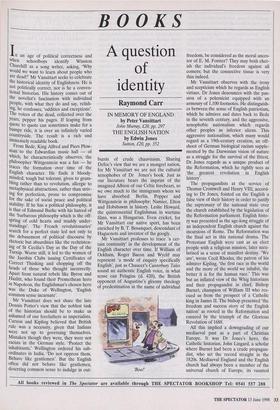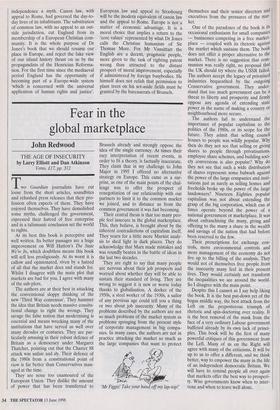BOOKS
A question of identity
Raymond Carr
In an age of political correctness and when schoolboys identify Winston Churchill as a song writer, asking, 'Why would we want to learn about people who are dead?' Mr Vansittart seeks to celebrate the historical identity of Englishness. He is not politically correct, nor is he a conven- tional historian. His history comes out of the novelist's fascination with individual people, with what they do and say, relish- ing, he confesses, 'oddities and exceptions'. The voices of the dead, collected over the years, pepper his pages. If leaping from quote to quote can sometimes make for a bumpy ride, it is over an infinitely varied countryside. The result is a rich and immensely readable book. From Bede, King Alfred and Piers Plow- man to the Edwardian music hall — of which, he characteristically observes, the philosopher Wittgenstein was a fan — he traces the formation over time of the English character. He finds it bloody- minded, tough but tolerant, given to grum- bling rather than to revolution, allergic to metaphysical abstractions, rather than striv- ing for perfection, prone to compromise for the sake of social peace and political stability. If he has a political philosophy, it is that of Edmund Burke with his hatred of the 'barbarous philosophy which is the off- spring of cold hearts and muddy under- standings'. The French revolutionaries' search for a perfect state led not only to the debasement of political discourse by rhetoric but absurdities like the rechristen- ing of St Cecilia's Day as the Day of the Turnip. Worse still, it led to the women of the Jacobin Clubs issuing Certificates of Correct Thinking and chopping off the heads of those who thought incorrectly. Apart from natural rebels like Byron and Hazlitt, who found their Promethean hero in Napoleon, the Englishman's chosen hero was the Duke of Wellington, 'English common sense incarnate'.
Mr Vansittart does not share the late Dennis Potter's view that the noblest task of the historian should be to make us ashamed of our forefathers as imperialists. Curzon and Kipling believed that British rule was a necessity, given that Indians were not up to governing themselves. Mistaken though they were, they were not racists in the German style. 'Protect the inhabitants,' Wellington ordered his sub- ordinates in India. 'Do not oppress them. Behave like gentlemen'. But the English often did not behave like gentlemen, deserting common sense to indulge in out- bursts of crude chauvinism. Sharing Defoe's view that we are a mongrel nation, for Mr Vansittart we are not the cultural xenophobes of Dr Jones's book. Just as our literature bears the imprint of the imagined Albion of our Celtic forebears, so we owe much to the immigrants whom we have absorbed: Berlin, Popper and Wittgenstein in philosophy; Namier, Elton and Hobsbawm in history. Leslie Howard, the quintessential Englishman in wartime films, was a Hungarian. Even cricket, for Mr Vansittart our native sport, has been enriched by B. T. Bosanquet, descendant of Huguenots and inventor of the googly.
Mr Vansittart professes to trace `a cer- tain continuity' in the development of the English character over time. If William of Ockham, Roger Bacon and Wyclif may represent 'a mode of enquiry specifically English', just as Chaucer's Canterbury Tales sound an authentic English voice, in what sense can Pelagius (d. 420), the British opponent of Augustine's gloomy theology of predestination in the name of individual
'Boo!'
freedom, be considered as the moral ances- tor of E. M. Forster? They may both cher- ish the individual's freedom against all comers; but the connective tissue is very thin indeed.
Mr Vansittart observes with the irony and scepticism which he regards as English virtues. Dr Jones denounces with the pas- sion of a polemicist equipped with an armoury of 1,100 footnotes. He distinguish- es between the sense of English patriotism, which he admires and dates back to Bede in the seventh century, and the aggressive, xenophobic nationalism which regards other peoples as inferior aliens. This aggressive nationalism, which many would regard as a 19th-century creation, an off- shoot of German biological racism supple- mented by the Darwinian vision of nature as a struggle for the survival of the fittest, Dr Jones regards as a unique product of the Reformation, which he rightly sees as `the greatest revolution in English history'.
The propagandists at the service of Thomas Cromwell and Henry VIII, accord- ing to Dr Jones, foisted on the English a false view of their history in order to justify the supremacy of the national state over the church established by the legislation of the Reformation parliament. English histo- ry was presented as the age-long struggle of an independent English church against the incursions of Rome. The Reformation was the final act in this national drama. The Protestant English were cast as an elect people with a religious mission, later secu- larised as a sense of manifest destiny. 'We are', wrote Cecil Rhodes, the patron of his admirer Kipling, 'the first race in the world and the more of the world we inhabit, the better it is for the human race.' This was but an inflated view of the Whig historians and their propagandist in chief, Bishop Burnet, champion of William III who res- cued us from the prospect of a Catholic king in James II. The bishop presented 'the freedom and success story of the English nation' as rooted in the Reformation and ensured by the triumph of the Glorious Revolution of 1688.
All this implied a downgrading of our mediaeval past as a part of Christian Europe. It was Dr Jones's hero, the Catholic historian, John Lingard, a scholar where Burnet had been a crude propagan- dist, who set the record straight in the 1820s. Mediaeval England and the English church had always been a member of the universal church of Europe, its vaunted independence a myth. Canon law, with appeal to Rome, had governed the day-to- day lives of its inhabitants. The substitution of common law, with no appeal to an out- side jurisdiction, cut England from its membership of a European Christian com- munity. It is the whole purpose of Dr Jones's book that we should resume our place in Europe, and reject the fake view of our island history thrust on us by the propagandists of the Henrician Reforma- tion. For the first time since the mediaeval period England has the opportunity of becoming part of a Europe-wide system `which is concerned with the universal application of human rights and justice'. European law and appeal to Strasbourg will be the modern equivalent of canon law and the appeal to Rome. Europe is not a matter of economic advantage. It is a moral choice that implies a return to the `core values' represented by what Dr Jones calls the Christian humanism of Sir Thomas More. For Mr Vansittart the English are a decent, pragmatic people, more given to the task of righting patent wrong than attracted to the distant prospect of moral improvement, especially if administered by foreign busybodies. He himself does not relish that permission to plant trees on his set-aside fields must be granted by the bureaucrats of Brussels.



































































 Previous page
Previous page